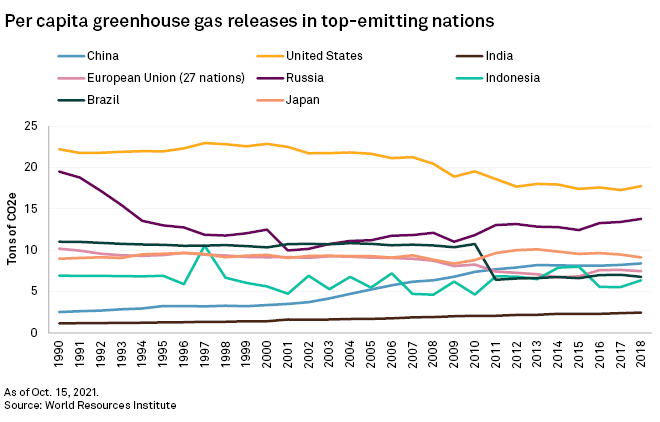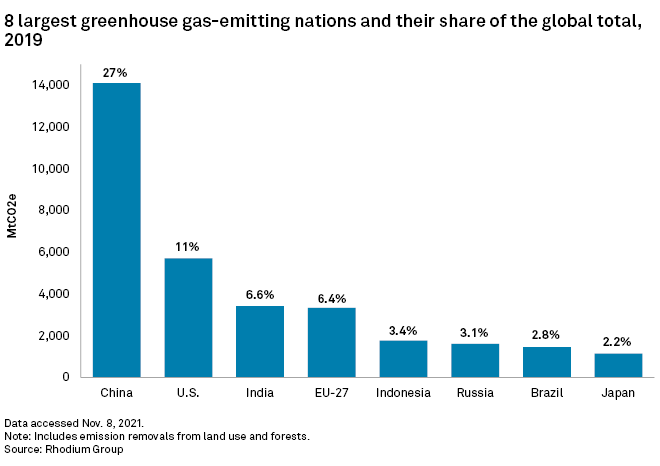What came out of COP26?
[ad_1]
Prioritize commitments
National climate commitments at COP26 fail to meet Paris targets, according to analyzes
The world’s eight largest emitters account for nearly two-thirds of all greenhouse gases that humans spew into the atmosphere, and all of those countries are failing to meet their net-zero emissions commitments, climate scientists have warned.
A key goal of the COP26 climate summit in Glasgow, Scotland, now in its second and final week, was to keep the global temperature rise of 1.5 degrees C above pre-industrial levels “to at hand “. The high-stakes summit was the first time nations would assess progress after signing the 2015 Paris Agreement on climate change. Importantly, countries were expected to arrive at COP26 with new carbon reduction targets for 2030 that would keep them on track to decarbonize by mid-century.
But with just a few days at the summit, concern is growing over the huge gap between what countries plan to do to slow emissions by 2030 and what is needed to keep warming within 1.5. degree.
The efforts of the most emitting countries – China, the United States, India, the European Union, Indonesia, Russia, Brazil and Japan – all range from “insufficient†to very or very insufficient, according to a new analysis from the Climate Action Tracker. A separate United Nations report released on November 9 concluded that even if formal climate commitments known as Nationally Determined Contributions, or NDCs, were implemented, warming by the turn of the century could reach 2 , 7 degrees, well above the Paris targets.
“Not a single country has short-term policies in place to get on the right track towards its own goal of net zero,” said Niklas Höhne of the NewClimate Institute, one of the organizations behind the Climate Action Tracker. “We would emit in 2030 double what we should emit if we want to [reach] 1.5 degrees. ”
A look at the commitments that the top seven emitting countries and the 27-country European Union made in the weeks and months leading up to COP26 makes it clear why the climate breakthrough many hoped for might not materialize.
Weak commitments, inconsistent policies
Indonesia and Brazil submitted the same NDC climate pledge ahead of COP26 as they did in 2015, although Brazil’s was effectively weakened, according to Climate Action Tracker analysis. Brazil, in its update, allowed an increase in its base year emissions that it uses as a baseline, which means that Brazil can continue to increase its emissions while meeting its targets.
Russia’s updated NDC did not show an increase in ambition, and the country’s net zero target for 2060 has not been officially adopted. India announced a long-awaited net zero goal on November 1, saying it would decarbonize its economy by 2070 – two decades later than what scientists believe is necessary to keep climate disruption manageable. India has yet to submit a new NDC.
China, also with a 2060 net zero target but a relatively detailed NDC, continues to invest in coal production, as does Indonesia. Japan has submitted an enhanced NDC that calls for a 46% reduction in emissions from 2013 levels by 2030, close to the 50% required to bring the country into line with the 1.5-degree target. But Japan’s plan to get another 19% of its electricity from coal-fired power plants in 2030 is incompatible with the goals of the Paris Agreement, according to the Climate Action Tracker analysis.
The 27 countries of the European Union adopted and funded its ambitious Green Deal this year, imposing a 55% reduction in emissions from 1990 levels by 2030. But many EU member states have stepped up to the plate. time to implement these policies, which means they might not achieve this goal. Climate Action Tracker rated the EU as “insufficientâ€.
The US NDC, meanwhile, hangs in the balance of Washington’s politics. It remains uncertain whether the Biden administration’s ambitious climate agenda will be fully implemented and whether the world’s second-largest emitter and largest producer of greenhouse gases per capita will deliver on its commitment to the Treaty of Paris.
Without real policies to back the announcements and promises, declaring progress at COP26 is premature, many researchers say. On November 4, the International Energy Agency caused a stir when it predicted that if all net zero commitments were implemented and countries met a global voluntary commitment on methane, global warming would be limited. at 1.8 ° C, approaching the Paris target.

COP26: New climate commitments “still far” from Paris’ trajectory by 2030
New and updated climate commitments from governments still fall short of the efforts needed to meet the goals of the Paris Agreement on climate change, the United Nations Environment Program said in an October 26 report. .
Read the entire article
Updated climate commitments still fail to meet global temperature targets: UNEP
New and updated climate commitments from governments still fall short of the efforts needed to meet the goals of the Paris Agreement on climate change, the United Nations Environment Program said in an October 26 report. .
Read the entire article
Global Methane Pledge signatories spend 90 years before official launch
More than 90 countries have now joined an international pledge to reduce methane emissions ahead of the initiative’s official launch later on November 2 at the United Nations Climate Change Conference in Glasgow, UK.
Read the full report
OPEC’s Saudi Arabia, UAE push for emission reductions, not fossil fuel extinction
While highlighting their green investments, key OPEC members Saudi Arabia and the United Arab Emirates on November 10 defended the struggling oil industry at the United Nations Climate Change Conference, saying that environmental policies should be balanced with energy security and economic development.
Read the entire article
Saudi target of net zero emissions could go beyond 2060, depending on circumstances: minister
Saudi Arabia’s 2060 net-zero emission target could be derailed by “unforeseen circumstances” as achievement of the target depends on a number of factors, including developments in technology, a declared the country’s energy minister on Nov. 3.
Read the entire article
Nigeria promises to reach net zero by 2060 but stresses role of gas
Nigeria, Africa’s largest oil producer, has pledged to achieve net zero carbon emissions by 2060 while stressing the importance of gas as a transitional fuel, President Muhammadu Buhari said in late November during of the United Nations Climate Change Conference in Glasgow, Scotland.
Read the entire article
India’s 2030 targets pose a long-term challenge to 2070 Net-Zero
India’s new climate goals of reducing carbon intensity and boosting renewable energy by 2030 pose serious challenges for a coal-dominated economy, commentators told S&P Global Platts.
Read the entire article
Biden told COP26 that the United States will “sprint” to meet the climate target by 2030
President Joe Biden spoke at the COP26 climate summit in Glasgow, Scotland on November 1, seeking to assure the world that the United States is tackling greenhouse gas emissions head-on as that his policies have been curtailed by Congress and could be blocked by the US Supreme Court.
Read the entire article
Russia to refocus its energy strategy to achieve carbon neutrality by 2060
Russia’s goal of being carbon neutral by 2060 – announced by President Putin ahead of the COP26 climate meeting – will require a major restructuring of its economy, which today relies heavily on income oil and gas.
Read the entire article
[ad_2]


Comments are closed.